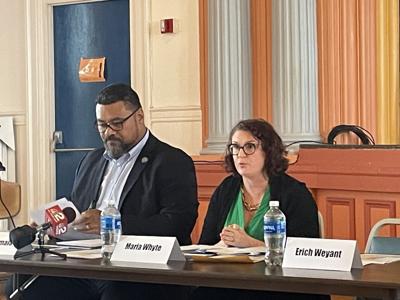This summer will be critical for the time after construction is finished on the Buffalo BillsŌĆÖ new stadium.
ThatŌĆÖs when some of the most important hires will be made for hospitality provider Legends, helping it prepare to meet goals to include small businesses and entities from disadvantaged communities at the $2.2 billion stadium.
It will also be a time when the transportation hub project to make travel in and out of the facility more seamless advances with the scheduling of a public forum.
The Bills said they have learned important lessons from the construction project ŌĆō and reaching goals to involve minority, women and military service-disabled-run companies ŌĆō and are taking them into account in the operation and maintenance of the new stadium.
ŌĆ£We are moving forward with our plan to ensure that we put every effort thatŌĆÖs commercially possible to reach those goals,ŌĆØ Penny Semaia, vice president of stadium relations for the Bills, said at MondayŌĆÖs meeting of the Community Benefits Oversight Committee.
People are also reading…
ŌĆ£Our post-construction goals are lofty, but so were the construction goals,ŌĆØ he added. ŌĆ£In the communications weŌĆÖre having with Legends, weŌĆÖre not trying to shake or shift things that are drastically different than the process that we did prior, but we wanted to make sure that we did the lessons learned and identify where the opportunities are.ŌĆØ

Penny Semaia, vice president of stadium relations for the Bills, and Maria Whyte, chief of staff at the Community Foundation for Greater Buffalo, listen to discussion during Monday's meeting of the Community Benefits Oversight Committee.
Legends will be expected to launch initiatives to maximize the participation of local, small and disadvantaged businesses in retail, maintenance and concessions. The company has taken charge of most of the Bills sales and retail operations and will be in charge of the new stadiumŌĆÖs food and beverage program.
It is still in the process of hiring for two of its highest-level jobs at the new stadium ŌĆō general manager and executive chef. Both positions have been posted.
Legends will soon also post job openings for the director of human resources and director of sales ŌĆō key roles as it tries to work with more small businesses and vendors in the region.
By the summer and into the fall, the Bills and Legends plan to map out opportunities for community sessions where they can get more information out to the public and small businesses about opportunities, Semaia said.
However, Semaia added that he could not yet say when Legends would start entering into contracts with these businesses.
Legends is also now developing the technology required for its operations at the stadium.
The teamŌĆÖs workforce consultant, Developments by JEM, just finished hosting a second cohort of 23 businesses to help them get certified as a Minority and Women Owned Business Enterprise on the state and county levels for potential future opportunities at the stadium and other projects in the region. Five have submitted their applications for the MWBE certifications. The first cohort had 29 businesses.
Because a business gets certified as an MWBE does not mean the Bills will automatically be contracting with it, Semaia said. But those businesses are eligible to apply for opportunities with the team.
The oversight committee had been asking the team for months to provide more details about post-construction initiatives to help stay ahead of goals established in the agreement.
ŌĆ£This is a lot more information than weŌĆÖve heard so far about the operations side of the equation, so I appreciate the increased clarity,ŌĆØ said member Maria Whyte, chief community impact officer and chief of staff at the Community Foundation.
The Bills are also working with the Niagara Frontier Transportation Authority on putting together the transportation hub at the stadium.
TheyŌĆÖll hold a public hearing by the summer to release information and gather feedback to prepare for the hub, to be located across from the stadium and set to open at the start of the 2026 season.
Semaia said the team learned from the construction process to be more proactive in engaging the community and potential vendors.
The Bills also set up a separate website that went live Saturday that includes a portal for people to submit community vulnerabilities. The committee has asked for months for a separate website from the teamŌĆÖs page, and the Bills had been working on creating it.
With the teamŌĆÖs fiscal year ending March 31, the Bills are now working on their annual spending report for year two of the agreement to put $3 million each year for 33 years into community initiatives as part of the CBA. The report will be out by July 29.
The committee also passed a resolution identifying youth services as the priority community need for the Bills to focus on in their upcoming fiscal year. Members said they feel it is an accurate reflection of what they heard during a public hearing in December.
The resolution identifies the variety of needs of youth and young adults in disadvantaged communities from the ages of 12 to 29. They include youth employment, job training, apprenticeships, mentoring and coaching opportunities, financial literacy, food, transportation and housing needs, mental health, sports, afterschool programs and access to cultural spaces.
ŌĆ£It really puts the spotlight on the needs of the youth,ŌĆØ Semaia said. ŌĆ£We recognize that there are number of issues that they face.ŌĆØ

















